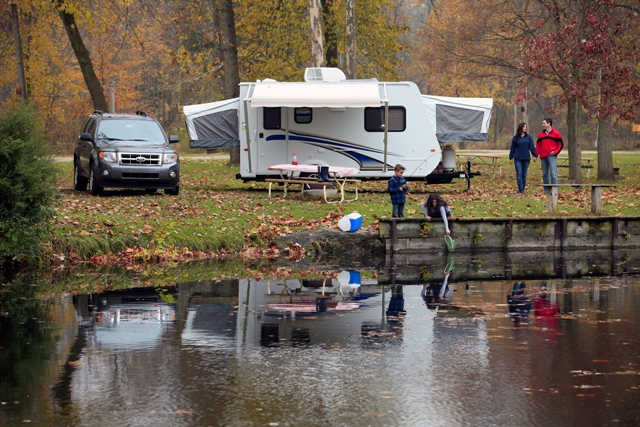Private Purchase
There are basically two ways to buy an RV; through a dealer or privately (from an individual). Both can be rewarding sources for finding an RV and occasionally a real bargain. This next section may help you avoid some of the more common pitfalls. If you purchase privately you should pay less. You are giving up a great deal of service and support. Before deciding, know what you will be missing.
Many people choose to buy their first RV privately. Often they buy the “story” as much as the RV. These deals may sound like bargains but the buyer usually pays far too much—and will get far less than they were led to believe. It is not unusual for a dealer to spend thousands of dollars on repairs to bring a used RV up to safety and operational standards. When you buy privately, from an individual, you’re buying as-is and getting no warranty. You will have no one to go to for help with a problem. No one has checked out the RV. You will have to find your own service. This is almost certainly a recipe for disaster and no way to really get to know the fun of RVing
Pitfalls of a Private Purchase
It is certainly possible to find a good value when buying privately. Bargains can be found as long as you are willing to do your homework and put up with the hassles involved. The following are some of the problems inherent in buying an RV privately. Weigh each of these into your purchase decision.
No Support
There is no one to stand behind the product with service or support. The basic rule of law in business is “Buyer Beware.” The only thing that keeps a dealer accountable is his need to maintain the dealership’s reputation in order to secure future business and avoid bad “word of mouth.” A private seller has no motivation for fair and honest dealings, or for full disclosure of problems. Basically, if he can get you to sign the title, he is home free. Yes, you could sue, but it’s difficult to prove verbal promises and it is expensive. Plus, the success rate for this type of law suit is very low. Assume you will be completely on your own and avoid relying on verbal representations. Make the seller put all promises in writing!
No Warranty
The RV is being sold as-is with no warranty. You will be responsible for any expenses incurred to correct any defects, which currently exist or may occur in the future. It is not unusual for a dealer to spend two, three, even four thousand dollars or more to put a used RV into safe and proper operating condition. A reputable dealer cannot sell an RV in any less condition and expect to generate repeat business or referrals from a new owner. He can’t afford it.
No Fitness Check
There is no reliable way to be sure the RV is fit to be used for your intended purpose. The RV probably has not been checked or brought up to safe operating conditions. It may or may not be working properly. It may or may not be safe to use. Once you buy it and discover a problem, it’s usually extremely difficult to go back to the seller for help. You are stuck! Owners often live with a problem and get used to it even though it may not be safe.
I was once appraising a customer’s motorhome and discovered that the generator wouldn’t start. The owner explained it away by saying: “That’s no problem, you just stick this prybar into the flywheel, give it a turn and she’ll start right up!” I was amazed at how non-chalant he was about an extremely dangerous practice. Later I found out he had been taught the procedure when he bought the RV from a private seller. Incredibly, he believed it was supposed to work that way!
No Financing Available
You will need to arrange for your own financing, usually at rates and terms less competitive than those available through top national RV financing sources. Most local banks are unwilling to do the long terms and low down payments that the big RV finance institutions will.
No Trades
Usually a private seller will not take a trade. You will probably have to sell your trade yourself. If you’re in a position where you need to sell your trade before you buy, you may not be able to even consider buying the RV.
No Orientation
How do you know how to properly work all of the appliances and systems of your new RV? Generally, a private sale ends with a limited walk through and explanation of how things work, if any. Most just hand you the keys and you’re on your own to figure it out. If you’re lucky, the RV will still have all the original documentation and owner’s manuals to work with. Unfortunately, many are poorly written and short on explanations and details. RVs are complicated, and a thorough explanation is essential. You should demand a complete and comprehensive orientation to the entire RV. The information should come from someone with experience and knowledge of safe and proper operation of all the components and the overall RV itself. An orientation can and often does pass on bad information such as the aforementioned generator example.
No Title / Licensing Service
Was the tax paid before you bought it? Can you get a good title in your name? Is the seller really the owner? Is this RV what it’s supposed to be? Private sellers often try to shortcut licensing procedures and just hand you a title. Most states require both buyer and seller to sign the title in front of a Notary Public. All of these issues can be avoided by not dealing with a private seller. If you must deal privately, don’t hand over your money until an authorized agent for the state prepares all the required paperwork. Don’t try to avoid taxes or fees and put yourself in a position where you can’t seek a good remedy to a broken contract without admitting that you broke the law. Don’t allow the seller to skip this step.
I regularly run into cases where the “owner” has no title in his name. The seller “sold” him an RV with a bad title and now, years later, he wants to sell or trade and can’t because he has a bad title. You can not sell an RV without a title in your name.
Avoid Branded Titles
Many RVs involved in floods, accidents, or other insurance claims are “totaled” and then sold as salvage. The titles are branded with a code to note them as severely damaged. Some clean up amazingly well and look good. Totaled RVs are often hard to spot until the weather changes (or you tow it or drive it for a few hundred miles) and by then it’s too late. A Notary/License agent should spot the code and notify you. Again, don’t pay first!
If you’re going to buy privately, from an individual, be sure you know what you’re getting, and be sure you are getting a real bargain price.
The following interview sheet is a great way to identify problems during your shopping. Don’t consider buying privately without completing it.
PRIVATE SELLER INTERVIEW
Use this form to interview private sellers and evaluate privately owned RVs for sale. This questionnaire should help identify potential problems. Use it to get “the rest of the story.” Don’t buy any private unit without it!
1. When was the RV last used? Where did you go? How was the trip? What problems were encountered?
How were they handled?
_________________________________________________________________________________
2. Has the RV ever been in a flood, fire, or collision? If so explain:
_________________________________________________________________________________
3. Do you have maintenance records? Who did the regular service work and when? Oil Changes?
Appliance gas leak checks? Winterization with RV antifreeze? Sealant checks? Do you have receipts? Dates?
When was the last regular service performed?
_________________________________________________________________________________
4. How long have you owned the RV? Where did you buy it? How much did you pay?
Why do you want to sell?
_________________________________________________________________________________
5. What did you like most and least about the RV? Why?
_________________________________________________________________________________
6. What is the worst problem you’ve ever encountered with the RV?
_________________________________________________________________________________
7. Are the tires original? If not, were they replaced with the correct size and load range capacity?
_________________________________________________________________________________
8. Any leaks or water damage anywhere in the RV?
Any soft spots, stains or bubbles in walls, ceiling, roof, sidewalls, or floor?
________________________________________________________________________________
9. Anyone ever smoke in the RV?
________________________________________________________________________________
10. Have any pets traveled in the RV? Any odor problems?
_________________________________________________________________________________
11. Has the RV ever been used as a rental? Dates? Miles? Records?
_________________________________________________________________________________
12. Any items added which were not installed by the factory? If so, what and when? Who installed?
_________________________________________________________________________________
13. Do you have clear title to the vehicle? No liens or encumbrances? Is it in your name?
If a payoff, how do we handle transfer of title?
_________________________________________________________________________________
14. Is everything in proper, safe working order?
_________________________________________________________________________________
15. Is state inspection current? Would it pass today? Who usually does your inspection work?
_________________________________________________________________________________
16. How did you arrive at your price? How does your price compare to the current book value?
If more than book, why should I pay more? If less than book, why did you price it less? What’s wrong with it?
_________________________________________________________________________________
17. What guarantee do I get from you? If something doesn’t work that you said does, what do I do?
What will you do for me?
_________________________________________________________________________________
18. Can I have the RV evaluated by a reputable RV technician/dealership?





